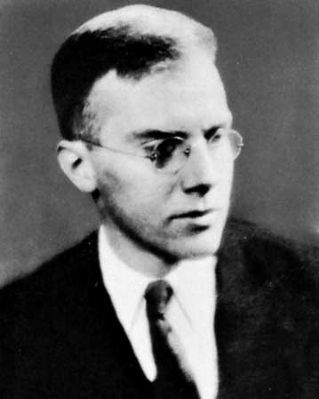Originally published in the collection Among the Lost People, 1934
Snow fell across southeastern Wisconsin last night, purifying the landscape and dropping temperatures by a good twenty degrees. It makes this the perfect time to highlight a story that is not merely a great tale of horror, but also one of the most anthologized - and debated - works of short fiction in the English language.
I first discovered the story over forty years ago, but without any knowledge of the childhood trauma that threatened to overwhelm Aiken throughout his life. In a fit of violent dementia, his brilliant but erratic father shot his mother to death before turning the gun upon himself - and leaving an eleven year old Conrad to discover the bodies. The incident enshrouded the entirety of his years, growing more feverish the closer Aiken came to the age of his
 father at the time of the murder-suicide. The writer within turned to the healing balm of verse, crafting poetry that was lyrical, delicate, lush with symbolism that border on the melodic (his poems have been a natural inspiration for composers). By 1930 his verse had earned Aiken the Pulitzer Prize, but soon after the win he began to explore narrative fiction - fiction that was darker, and eventually seen by scholars as a form of therapy for the often-suicidal author.
father at the time of the murder-suicide. The writer within turned to the healing balm of verse, crafting poetry that was lyrical, delicate, lush with symbolism that border on the melodic (his poems have been a natural inspiration for composers). By 1930 his verse had earned Aiken the Pulitzer Prize, but soon after the win he began to explore narrative fiction - fiction that was darker, and eventually seen by scholars as a form of therapy for the often-suicidal author."Silent Snow, Secret Snow" was included in the 1934 collection Among the Lost People, and, given Aiken's penchant for symbolism, and given a symbol's infinite number of meanings, the story's purpose changes with the reader and, of late, with the generations. Does Paul, the young protagonist who is increasingly living within a mental world of drifting, hissing, seductive "snow," suffer from madness? Is he becoming deaf? Contemporary audiences are citing the tale as a metaphor for autism; is this the case? Whatever the reason, Aiken's wizardry with words enfolds us in the contradiction of a world where the darkest shadows are sculpted of mounds of blinding, anesthetizing white. Achieving this magical reversal of imagery is a literary tour de force, one that draws the reader as deeply into the surrounding snow as it does poor Paul.
Producer and writer Gene Kearney had a great and abiding love for the story, adapting it for a second season episode of Rod Serling's Night Gallery, and famously narrated in the inimitable, plummy tones of Orson Welles. However, that was actually Kearney's second attempt at filming the tale, as five years earlier he crafted an independent short in black and white. If one could only wed the colorless cinematography and realistic locations of the first effort with Welles' evocative voice-over...Here is that 1966 version, uncompromisingly faithful to Aiken's text. But don't allow this to be your only encounter with this short story masterpiece. No matter where you live, regardless of your climate, "Silent Snow, Secret Snow" will allow you to walk out into Winter - and allow Winter to enter you, as well.
Note - The final words are cut off in this archived YouTube video. They are - "Do you hear? We are leaning closer to you..."
2 comments:
Great, informative write-up on a tale I've only known through its Night Gallery adaptation (that NG painting, in fact, was my MySpace profile pic for ages!). Here in the Northeast it's unseasonably warm but this post has put me in the mood for winter!
Jeff, in 2005, that painting was my Christmas card! :-)
Post a Comment